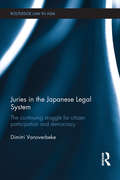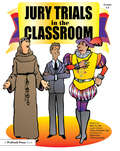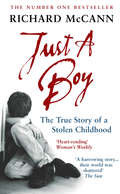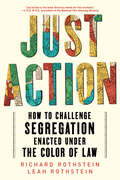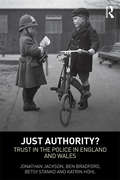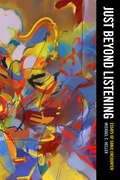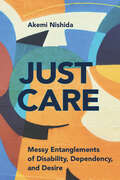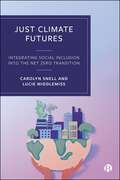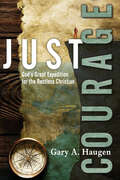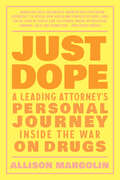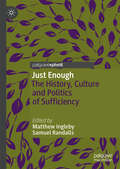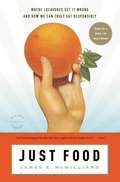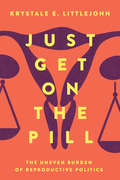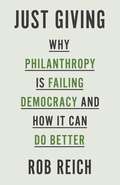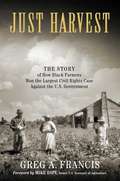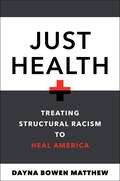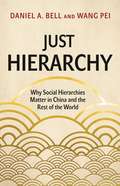- Table View
- List View
Juries in the Japanese Legal System: The Continuing Struggle for Citizen Participation and Democracy (Routledge Law in Asia)
by Dimitri VanoverbekeTrial by jury is not a fundamental part of the Japanese legal system, but there has been a recent important move towards this with the introduction in 2009 of the lay assessor system whereby lay people sit with judges in criminal trials. This book considers the debates in Japan which surround this development. It examines the political and socio-legal contexts, contrasting the view that the participation of ordinary citizens in criminal trials is an important manifestation of democracy, with the view that Japan as a society where authority is highly venerated is not natural territory for a system where lay people are likely to express views at odds with expert judges. It discusses Japan’s earlier experiments with jury trials in the late 19th Century, the period 1923-43, and up to 1970 in US-controlled Okinawa, compares developing views in Japan on this issue with views in other countries, where dissatisfaction with the jury system is often evident, and concludes by assessing how the new system in Japan is working out and how it is likely to develop.
Jury Decision Making: The State of the Science (Psychology and Crime #8)
by Dennis J. DevineWhile jury decision making has received considerable attention from social scientists, there have been few efforts to systematically pull together all the pieces of this research. In Jury Decision Making, Dennis J. Devine examines over 50 years of research on juries and offers a "big picture" overview of the field. The volume summarizes existing theories of jury decision making and identifies what we have learned about jury behavior, including the effects of specific courtroom practices, the nature of the trial, the characteristics of the participants, and the evidence itself. Making use of those foundations, Devine offers a new integrated theory of jury decision making that addresses both individual jurors and juries as a whole and discusses its ramifications for the courts.Providing a unique combination of broad scope, extensive coverage of the empirical research conducted over the last half century, and theory advancement, this accessible and engaging volume offers "one-stop shopping" for scholars, students, legal professionals, and those who simply wish to better understand how well the jury system works.
Jury Trials in the Classroom: Grades 5-8
by Betty M. SeeTransform your classroom into a courtroom and get ready for students to take part in a great learning adventure. The six trial simulations in this book let students delve into criminal and civil law with motivating cases that mirror situations in fairy tales, nursery rhymes, literature, and history. In the roles of attorneys, members of the jury, defendants, witnesses, and courtroom personnel, students prepare and conduct cases. They will learn to use statements of fact and witness affidavits to determine guilt or innocence.The book is divided into three sections that: define the types of courts in the U.S. court system; explain how to carry out a mock trial; and give six ready-to-use court cases, including all necessary documents. The court cases allow students to understand both criminal and civil trials, with three types of each case. The cases allow you to stage trials involving Hansel and Gretel, John Wilkes Booth, Little Miss Muffet, Romeo and Juliet, Jack and Jill, and Little Red Riding Hood. Don't miss this opportunity to teach critical thinking and teach students how to weigh opposing points of view. The exciting results will motivate students to exercise their reasoning skills, polish their communication skills, and apply knowledge of the legal system. This will become one of your favorite classroom adventures.For more judicial activities, see Blind Justice and On Trial.Grades 5-8
Just A Boy: The True Story Of A Stolen Childhood
by Richard McCannOne October night in 1975 Richard, aged five, was alone in the house with his three sisters. It was 3am and their mother hadn't come home yet. Next morning, the police arrived to take the children away. Their mother had become the first victim of a serial killer soon to become known as the 'Yorkshire Ripper'. Passed from one violent home to another, the children were forgotten by all except the press. As the salacious headlines multiplied, Richard and his sisters were never able to recover from their mother's murder. Whilst Richard tried to handle the terror of his violent upbringing, his sister struggled to deal with memories of sexual abuse. Without love or support they spiralled away from help or happiness. Then one day Richard McCann, having reached suicidal rock bottom, decided no one was going to rescue their lives but him. It was the beginning of an inspirational transformation. Now he is able to tell the story of how the forgotten children of violence suffer, and how they can heal. A heartbreaking, uplifting story of survival and hope.
Just A Little Bit More: The Culture of Excess and the Fate of the Common Good
by T. Carlos AndersonIs America a Christian Nation? According to author T. Carlos Andersen, the true religion of the land is the confluence of commerce, materialism, and consumerism. Andersen, defining religion as "ultimate concern," claims our true devotion is found in material pursuits. It's been a good religion; it has fed, clothed, sheltered, and employed millions of Americans. It can go too far, however. When these pursuits become excessive, the religion breaks bad and the common good suffers.
Just A Mom
by Betty DegeneresThe mother of comedian Ellen DeGeneres explains ways parents can help themselves and their homosexual children to deal with homosexuality.
Just Action: How to Challenge Segregation Enacted Under the Color of Law
by Richard Rothstein Leah RothsteinThe Color of Law brilliantly recounted how government at all levels created segregation. Just Action describes how we can begin to undo it. In his best-selling book The Color of Law, Richard Rothstein demolished the de facto segregation myth that black and white Americans live separately by choice, providing “the most forceful argument ever published on how federal, state, and local governments gave rise to the reinforced neighborhood segregation” (William Julius Wilson). This landmark work—through its nearly one million copies sold—has helped to define the fractious age in which we live. The Color of Law’s unrefuted account has become conventional wisdom. But how can we begin to undo segregation’s damage? “It’s rare for a writer to feel obligated to be so clear on solutions to the problems outlined in a previous book,” writes E. J. Dionne, yet Richard Rothstein—aware that twenty-first-century segregation continues to promote entrenched inequality—has done just that, teaming with housing policy expert Leah Rothstein to write Just Action, a blueprint for concerned citizens and community leaders. As recent headlines informed us, twenty million Americans participated in racial justice demonstrations in 2020. Although many displayed “Black Lives Matter” window and lawn signs, few considered what could be done to redress inequality in their own communities. Page by page, Just Action offers programs that activists and their supporters can undertake in their own communities to address historical inequities, providing bona fide answers, based on decades of study and experience, in a nation awash with memes and internet theories. Often forced to respond to social and political outrage, banks, real estate agencies, and developers, among other institutions, have apologized for past actions. But their pledges—some of them real, others thoroughly hollow—to improve cannot compensate for existing damage. Just Action shows how community groups can press firms that imposed segregation to finally take responsibility for reversing the harm, creating victories that might finally challenge residential segregation and help remedy America’s profoundly unconstitutional past.
Just Ask a Woman: Cracking the Code of What Women Want and How They Buy
by Mary Lou QuinlanAuthor shows marketers and business leaders how to tap into America's most powerful consumers: women. Although they comprise just over half of the U.S. population, women buy or influence the purchase of eighty-five percent of all products and services.
Just Authority?: Trust in the Police in England and Wales
by Ben Bradford Jonathan Jackson Betsy Stanko Katrin HohlWhat does it mean to trust the police? What makes the police legitimate in the eyes of the policed? What builds trust, legitimacy and cooperation, and what undermines the bond between police and the public? These questions are central to current debates concerning the relationship between the British police and the public it serves. Yet, in the context of British policing they are seldom asked explicitly, still less examined in depth. Drawing on psychological and sociological explanatory paradigms, Just Authority? presents a cutting-edge empirical study into public trust, police legitimacy, and people’s readiness to cooperate with officers. It represents, first, the most detailed test to date of Tom Tyler’s procedural justice model attempted outside the United States. Second, it uncovers the social ecology of trust and legitimacy and, third, it describes the relationships between trust, legitimacy and cooperation. This book contains many important lessons for practitioners, policy-makers and academics. As elsewhere the dominant vision of policing in Great Britain continues to stress instrumental effectiveness: the ‘fight against crime’ will be won by pro-active and even aggressive policing. In line with work from the United States and elsewhere, Just Authority? casts significant doubt on such claims. When people find policing to be unfair, disrespectful and careless of human dignity, not only is trust lost, legitimacy is also damaged and cooperation is withdrawn as a result. Absent such public support, the job of the police is made harder and the avowed objectives of less crime and disorder placed ever further from reach.
Just Beyond Listening: Essays of Sonic Encounter (California Studies in Music, Sound, and Media #5)
by Michael C. HellerJust Beyond Listening asks how we might think about encounters with sound that complicate standard accounts of aurality. In a series of essays, Michael C. Heller considers how sound functions in dialogue with a range of sensory and affective modalities, including physical co-presence, textual interference, and spectral haunting. The text investigates sound that is experienced in other parts of the body, altered by cross-wirings of the senses, weaponized by the military, or mediated and changed by cultural practices and memory. Building on recent scholarship in sound studies and affect theory, Heller questions not only how sound propagates acoustically but how sonic presences temper our total experience of the world around us.
Just Care: Messy Entanglements of Disability, Dependency, and Desire (D/C: Dis/color)
by Akemi NishidaJust Care is Akemi Nishida’s thoughtful examination of care injustice and social justice enabled through care. The current neoliberal political economy has turned care into a business opportunity for the healthcare industrial complex and a mechanism of social oppression and control. Nishida analyzes the challenges people negotiate whether they are situated as caregivers, receivers, or both. Also illuminated is how people with disabilities come together to assemble community care collectives and bed activism (resistance and visions emerging from the space of bed) to reimagine care as a key element for social change. The structure of care, Nishida writes, is deeply embedded in and embodies the cruel social order—based on disability, race, gender, migration status, and wealth—that determines who survives or deteriorates. Simultaneously, many marginalized communities treat care as the foundation of activism. Using interviews, focus groups, and participant observation with care workers and people with disabilities, Just Care looks into lives unfolding in the assemblage of Medicaid long-term care programs, community-based care collectives, and bed activism. Just Care identifies what care does, and asks: Are some people’s needs more sacred and urgent than others?
Just Care: Messy Entanglements of Disability, Dependency, and Desire (D/C: Dis/color)
by Akemi NishidaJust Care is Akemi Nishida’s thoughtful examination of care injustice and social justice enabled through care. The current neoliberal political economy has turned care into a business opportunity for the healthcare industrial complex and a mechanism of social oppression and control. Nishida analyzes the challenges people negotiate whether they are situated as caregivers, receivers, or both. Also illuminated is how people with disabilities come together to assemble community care collectives and bed activism (resistance and visions emerging from the space of bed) to reimagine care as a key element for social change. The structure of care, Nishida writes, is deeply embedded in and embodies the cruel social order—based on disability, race, gender, migration status, and wealth—that determines who survives or deteriorates. Simultaneously, many marginalized communities treat care as the foundation of activism. Using interviews, focus groups, and participant observation with care workers and people with disabilities, Just Care looks into lives unfolding in the assemblage of Medicaid long-term care programs, community-based care collectives, and bed activism. Just Care identifies what care does, and asks: How can we activate care justice or just care where people feel cared affirmatively and care being used for the wellbeing of community and for just world making?
Just Climate Futures: Integrating Social Inclusion Into the Net Zero Transition
by Lucie Middlemiss Carolyn SnellIf we are to meet ‘Net Zero’ targets, both climate policies and our daily lives require significant change. The transition towards Net Zero will lead to inevitable trade-offs between social, economic and environmental objectives, and this transition could disproportionately impact households already struggling with poverty and precarity. This book takes a deep dive into the ways families and communities are, or could be, impacted by the implementation of climate policy. It demonstrates that participation in Net Zero requires people to be economically, culturally, socially and politically engaged ̶ and provides a practical roadmap to encourage and support a truly just transition.
Just Courage: God's Great Expedition for the Restless Christian
by Gary A. Haugen"There must be more to the Christian life than this—more than church each Sunday and waving to my neighbors and giving some clothes to Goodwill when I go through my closet each spring." These aren't bad things, of course. But they're safe and comfortable and easy. And there's a reason they're not satisfying your desire for something more significant and meaningful—we're created by God for adventure. International Justice Mission president Gary Haugen has found that engaging in the fight for justice is the most deeply satisfying way of life. This book shows how we too can be a part of God's great expedition.
Just Dope: A Leading Attorney's Personal Journey Inside the War on Drugs
by Allison MargolinFor readers of Dopesick and In the Realm of Hungry Ghosts, a celebrated cannabis attorney's personal look at the War on Drugs and what comes next for the drug legalization movementGetting high is something most of us do, and in many cases do safely--yet drugs remain a singular public enemy. In a ranging blend of memoir, pop culture, policy critique, and social analysis, LA-based criminal defense attorney Allison Margolin explores why--and what we can do about it.Informed by Margolin&’s experiences as a drug user, advocate, and the daughter of California&’s most renowned (and infamous) cannabis attorney, Just Dope offers a look at where our current drug policy fails. It exposes the true history of drug prohibition in the United States, sharing why it started, how it evolved, and where it stands now. And it looks unflinchingly at the false dichotomy between &“good&” drugs and &“bad&” drugs and Margolin&’s experience with programs like D.A.R.E that misguidedly ask you to &“Just Say No.&”For readers of All Day is a Long Time and In the Realm of Hungry Ghosts, Just Dope is an experiential tour-de-force of personal essay and whip-smart policy critique—and a vital call to knowledge and action.
Just Enough to Put Him Away Decent: Death Care, Life Extension, and the Making of a Healthier South, 1900-1955
by Kristine M. McCuskerAs the twentieth century began, Black and white southerners alike dealt with low life expectancy and poor healthcare in a region synonymous with early death. But the modernization of death care by a diverse group of actors changed not only death rituals but fundamental ideas about health and wellness. Kristine McCusker charts the dramatic transformation that took place when southerners in particular and Americans in general changed their thinking about when one should die, how that death could occur, and what decent burial really means. As she shows, death care evolved from being a community act to a commercial one where purchasing a purple coffin and hearse ride to the cemetery became a political statement and the norm. That evolution also required interactions between perfect strangers, especially during the world wars as families searched for their missing soldiers. In either case, being put away decent, as southerners called burial, came to mean something fundamentally different in 1955 than it had just fifty years earlier.
Just Enough: The History, Culture and Politics of Sufficiency
by Samuel Randalls Matthew InglebyThis book fosters a wide-ranging and nuanced discussion of the concept of ‘enough’. Acknowledging the prominence of notions of sufficiency in debates about sustainability, it argues for a more complex, culturally and historically informed understanding of how these might be manifested across a wide array of contexts. Rather than simply adding further case studies of sufficiency in order to prove the efficacy of what might be called ‘finite planet economics’, the book holds up to the light a crucial ‘keyword’ within the sustainability discourse, tracing its origins and anatomising its current repertoire of usages. Chapters focus on the sufficiency of food, drink and clothing to track the concept of 'enough' from the Middle Ages to the 21st century.By expanding the historical and cultural scope of sufficiency, this book fills a significant gap in the current market for authors, students and the wider informed audience who want to more deeply understand the changing and developing use of this term.
Just Food: Where Locavores Get It Wrong and How We Can Truly Eat Responsibly
by James E. McwilliamsWe suffer today from food anxiety, bombarded as we are with confusing messages about how to eat an ethical diet. Should we eat locally? Is organic really better for the environment? Can genetically modified foods be good for you? JUST FOOD does for fresh food what Fast Food Nation (Houghton Mifflin, 2001) did for fast food, challenging conventional views, and cutting through layers of myth and misinformation. For instance, an imported tomato is more energy-efficient than a local greenhouse-grown tomato. And farm-raised freshwater fish may soon be the most sustainable source of protein. Informative and surprising, JUST FOOD tells us how to decide what to eat, and how our choices can help save the planet and feed the world.
Just Get on the Pill: The Uneven Burden of Reproductive Politics (Reproductive Justice: A New Vision for the 21st Century #4)
by Krystale E. LittlejohnUnderstanding the social history and urgent social implications of gendered compulsory birth control, an unbalanced and unjust approach to pregnancy prevention. The average person concerned about becoming pregnant spends approximately thirty years trying to prevent conception. People largely do so alone using prescription birth control, a situation often taken for granted in the United States as natural and beneficial. In Just Get On the Pill, a keenly researched and incisive examination, Krystale Littlejohn investigates how birth control becomes a fundamentally unbalanced and gendered responsibility. She uncovers how parents, peers, partners, and providers draw on narratives of male and female birth control methods to socialize cisgender women into sex and ultimately into shouldering the burden for preventing pregnancy. Littlejohn draws on extensive interviews to document this gendered compulsory birth control—a phenomenon in which people who give birth are held accountable for preventing and resolving pregnancies in gender-constrained ways. She shows how this gendered approach encroaches on reproductive autonomy and poses obstacles for preventing disease. While diverse cisgender women are the focus, Littlejohn shows that they are not the only ones harmed by this dynamic. Indeed, gendered approaches to birth control also negatively impact trans, intersex, and gender nonconforming people in overlooked ways. In tracing the divisive politics of pregnancy prevention, Littlejohn demonstrates that the gendered division of labor in birth control is not natural. It is unjust.
Just Girls: Hidden Literacies and Life in Junior High
by Margaret J. FindersHighlighting the social importance of friendship, family and social networks in girls' sense of themselves, she suggests that literacy plays an important role in maintaining friendship groups and in the construction of the self.
Just Giving: Why Philanthropy Is Failing Democracy and How It Can Do Better
by Rob ReichThe troubling ethics and politics of philanthropyIs philanthropy, by its very nature, a threat to today’s democracy? Though we may laud wealthy individuals who give away their money for society’s benefit, Just Giving shows how such generosity not only isn’t the unassailable good we think it to be but might also undermine democratic values and set back aspirations of justice. Big philanthropy is often an exercise of power, the conversion of private assets into public influence. And it is a form of power that is largely unaccountable, often perpetual, and lavishly tax-advantaged. The affluent—and their foundations—reap vast benefits even as they influence policy without accountability. And small philanthropy, or ordinary charitable giving, can be problematic as well. Charity, it turns out, does surprisingly little to provide for those in need and sometimes worsens inequality.These outcomes are shaped by the policies that define and structure philanthropy. When, how much, and to whom people give is influenced by laws governing everything from the creation of foundations and nonprofits to generous tax exemptions for donations of money and property. Rob Reich asks: What attitude and what policies should democracies have concerning individuals who give money away for public purposes? Philanthropy currently fails democracy in many ways, but Reich argues that it can be redeemed. Differentiating between individual philanthropy and private foundations, the aims of mass giving should be the decentralization of power in the production of public goods, such as the arts, education, and science. For foundations, the goal should be what Reich terms “discovery,” or long-time-horizon innovations that enhance democratic experimentalism. Philanthropy, when properly structured, can play a crucial role in supporting a strong liberal democracy.Just Giving investigates the ethical and political dimensions of philanthropy and considers how giving might better support democratic values and promote justice.
Just Harvest: The Story of How Black Farmers Won the Largest Civil Rights Case against the U.S. Government
by Greg FrancisWhen a class-action lawsuit against the US government results in a billion dollar settlement for the aggrieved parties, you&’d expect the story to be headline news . . .to be posted on social media everywhere . . . to be adapted to film or even to a popular legal procedural series on TV . . .So why then have so many people never heard of Pigford vs. Glickman? Or the follow-up lawsuit, Pigford II? Or the Black Farmers Case, as the pair of these legal actions is often called? Could it be that the heart-wrenching story of Black farmers in America, and the monumental legal case that brought long-sought justice to them, is rarely told because it reflects so poorly on the US and its treatment of those whose ancestors helped make the nation an agricultural giant in the first place? Whatever the reason, the time to tell the full story has come and the person to share the gripping details is Greg Francis, one of the lead counsels in the historic case that finally helped Black farmers achieve equity. In Just Harvest, Francis narrates the dramatic twists and turns of the legal battle fought and won, and evidences the many years of ingrained discrimination and racism that preceded it. Awareness of this story makes us all witnesses to the history still unfolding— and while parts of what is recounted herein will enrage you, the hope is that this book will also inspire, inform, and motivate you to join the continuing fight for the rights of all Black farmers now and in the future.
Just Health: Treating Structural Racism to Heal America
by Dayna Bowen MatthewChoice Outstanding Academic Title 2023The author of the bestselling Just Medicine reveals how racial inequality undermines public health and how we can change itWith the rise of the Movement for Black Lives and the feverish calls for Medicare for All, the public spotlight on racial inequality and access to healthcare has never been brighter. The rise of COVID-19 and its disproportionate effects on people of color has especially made clear how the color of one’s skin is directly related to the quality of care (or lack thereof) a person receives, and the disastrous health outcomes Americans suffer as a result of racism and an unjust healthcare system.Timely and accessible, Just Health examines how deep structural racism embedded in the fabric of American society leads to worse health outcomes and lower life expectancy for people of color. By presenting evidence of discrimination in housing, education, employment, and the criminal justice system, Dayna Bowen Matthew shows how racial inequality pervades American society and the multitude of ways that this undermines the health of minority populations. The author provides a clear path forward for overcoming these massive barriers to health and ensuring that everyone has an equal opportunity to be healthy. She encourages health providers to take a leading role in the fight to dismantle the structural inequities their patients face. A compelling and essential read, Just Health helps us to understand how racial inequality damages the health of our minority communities and explains what we can do to fight back.
Just Here, Doctor (The Dr Clifford Chronicles)
by Dr Robert CliffordJust Here, Doctor is the true story of a young country doctor and his patients - a richly entertaining and humorous chronicle of the life of a small West Country community as seen through the eyes of its G.P. Dr Clifford has some marvellous stories to tell: about the home delivery of a cricket fan's baby - in between overs of a televised Test Match; of the time he rode off on a gigantic horse to attend a hunting casualty - and rode back in an ambulance as the casualty; and the amazing saga of his student rugby tour of France - the craziest, most drunken ever undertaken. Here too, on the more serious side, are moving accounts of the courage of ordinary people in the face of serious, even fatal illness. Teeming with colourful and curious places and characters, Just Here, Doctor is packed with comedy, drama and tragedy, every bit as warm and enthralling as James Herriot's famous stories of a vet's life.
Just Hierarchy: Why Social Hierarchies Matter in China and the Rest of the World
by Daniel A. BellA trenchant defense of hierarchy in different spheres of our lives, from the personal to the politicalAll complex and large-scale societies are organized along certain hierarchies, but the concept of hierarchy has become almost taboo in the modern world. Just Hierarchy contends that this stigma is a mistake. In fact, as Daniel Bell and Wang Pei show, it is neither possible nor advisable to do away with social hierarchies. Drawing their arguments from Chinese thought and culture as well as other philosophies and traditions, Bell and Wang ask which forms of hierarchy are justified and how these can serve morally desirable goals. They look at ways of promoting just forms of hierarchy while minimizing the influence of unjust ones, such as those based on race, sex, or caste.Which hierarchical relations are morally justified and why? Bell and Wang argue that it depends on the nature of the social relation and context. Different hierarchical principles ought to govern different kinds of social relations: what justifies hierarchy among intimates is different from what justifies hierarchy among citizens, countries, humans and animals, and humans and intelligent machines. Morally justified hierarchies can and should govern different spheres of our social lives, though these will be very different from the unjust hierarchies that have governed us in the past.A vigorous, systematic defense of hierarchy in the modern world, Just Hierarchy examines how hierarchical social relations can have a useful purpose, not only in personal domains but also in larger political realms.
